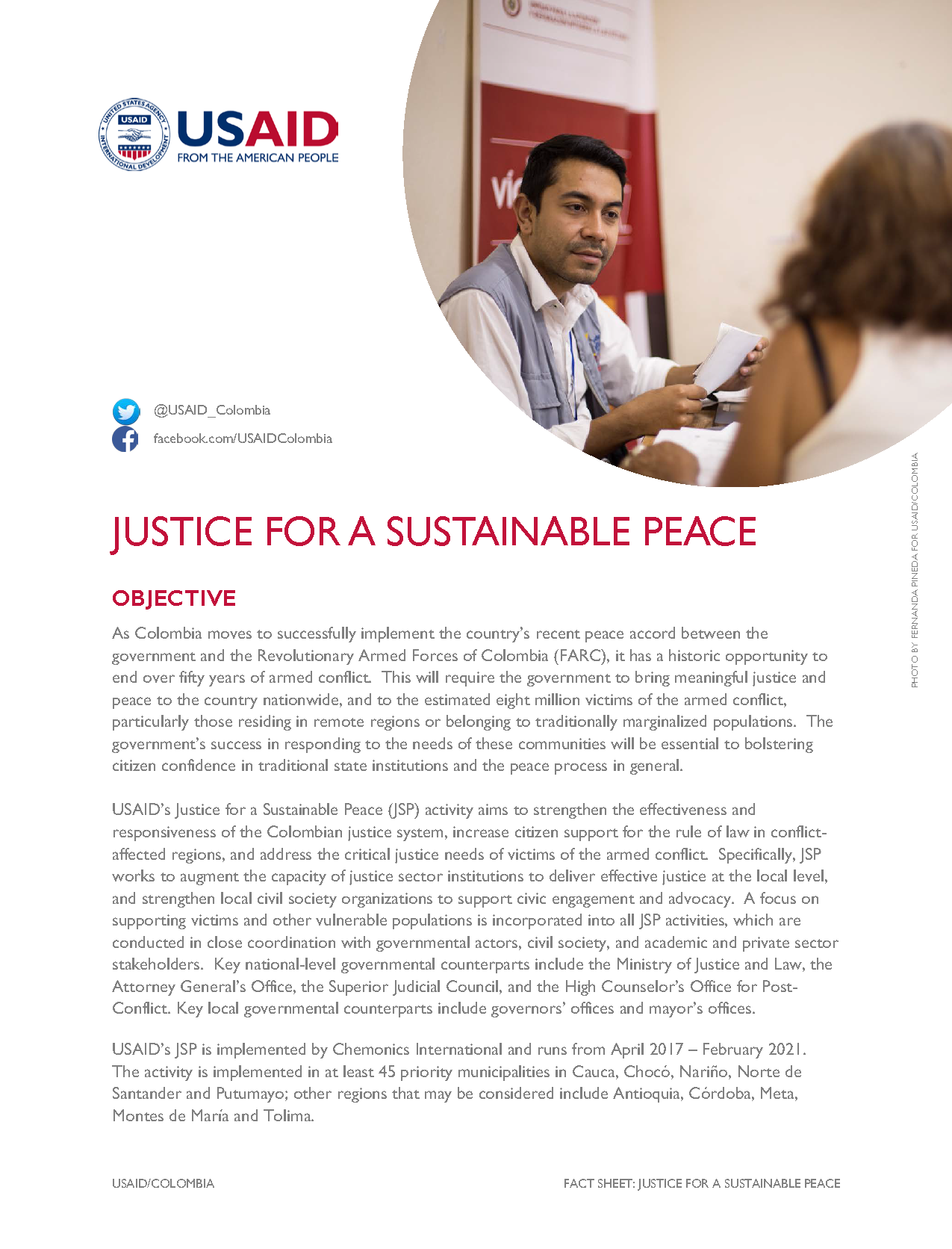Justice for a Sustainable Peace (JSP) ![]() (pdf - 144k)
(pdf - 144k)
OBJECTIVE
As Colombia moves to successfully implement the country’s recent peace accord between the government and the Revolutionary Armed Forces of Colombia (FARC), it has a historic opportunity to end over fifty years of armed conflict. This will require the government to bring meaningful justice and peace to the country nationwide, and to the estimated eight million victims of the armed conflict, particularly those residing in remote regions or belonging to traditionally marginalized populations. The government’s success in responding to the needs of these communities will be essential to bolstering citizen confidence in traditional state institutions and the peace process in general.
USAID’s Justice for a Sustainable Peace (JSP) activity aims to strengthen the effectiveness and responsiveness of the Colombian justice system, increase citizen support for the rule of law in conflict-affected regions, and address the critical justice needs of victims of the armed conflict. Specifically, JSP works to augment the capacity of justice sector institutions to deliver effective justice at the local level, and strengthen local civil society organizations to support civic engagement and advocacy. A focus on supporting victims and other vulnerable populations is incorporated into all JSP activities, which are conducted in close coordination with governmental actors, civil society, and academic and private sector stakeholders. Key national-level governmental counterparts include the Ministry of Justice and Law, the Attorney General’s Office, the Superior Judicial Council, and the High Counselor’s Office for Post-Conflict. Key local governmental counterparts include governors’ offices and mayor’s offices.
USAID’s JSP is implemented by Chemonics International and runs from April 2017 – February 2021. The activity is implemented in at least 45 priority municipalities in Cauca, Chocó, Nariño, Norte de Santander and Putumayo; other regions that may be considered include Antioquia, Córdoba, Meta, Montes de María and Tolima.
COMPONENTS
Increasing access to More Effective, Inclusive, and Responsive Justice-Related Services
Departments and municipalities in conflict-affected regions lack resources for effective institutions, and they are therefore unable to meet many justice-related needs. Consequently, the resulting void has been filled by illegal armed actors and criminal elements. JSP works at the local level to secure expanded resources for justice sector institutions to establish rural justice services; increase inter-institutional coordination among justice sector actors; strengthen justice houses, local justice systems, and alternative dispute resolution mechanisms; strengthen capacity of indigenous and Afro-Colombian communities’ ethnic justice mechanisms; establish rural justice services; and support the implementation of an inter-institutional approach to addressing gender and family conflicts.
Increasing Citizen Support for Rule of Law
A key element to strengthening the justice sector in the post-conflict period will be to mount ongoing pressure from the communities to improve the justice services they receive. JSP promotes the rule of law in targeted areas by increasing citizen awareness of justice sector institutions and services, strengthening civil society engagement with government on justice issues, increasing citizen use of formal and informal justice services, and strengthening ethnic justice and community conflict resolution mechanisms.
Strengthening Judicial Responses for Victims of the Armed Conflict
Ensuring that victims are supported as they seek justice for some of the gravest crimes committed during the armed conflict is fundamental to establishing lasting peace. JSP supports the GOC in developing effective judicial services and remedies by improving the effectiveness and transparency in land restitution judicial processes and addressing impunity for crimes such as gender-based violence, forced displacement, enforced disappearance, child recruitment, kidnapping, and homicide. JSP will also provide rapid response support for urgent justice-related needs in support of peace.
EXPECTED RESULTS
- Improved policies and strategies to address key limitations affecting local-level justice institutions and services, especially gaps related to staffing, technical capacity, resources, and funding.
- Strengthened capacity of local civil society organizations to engage in policy advocacy, decision-making, and government monitoring on justice-related issues.
- Expanded access to legal advice and/or representation for citizens participating in justice processes and procedures.
- Improved transparency and accountability of the court systems, including land restitution courts.








Comment
Make a general inquiry or suggest an improvement.